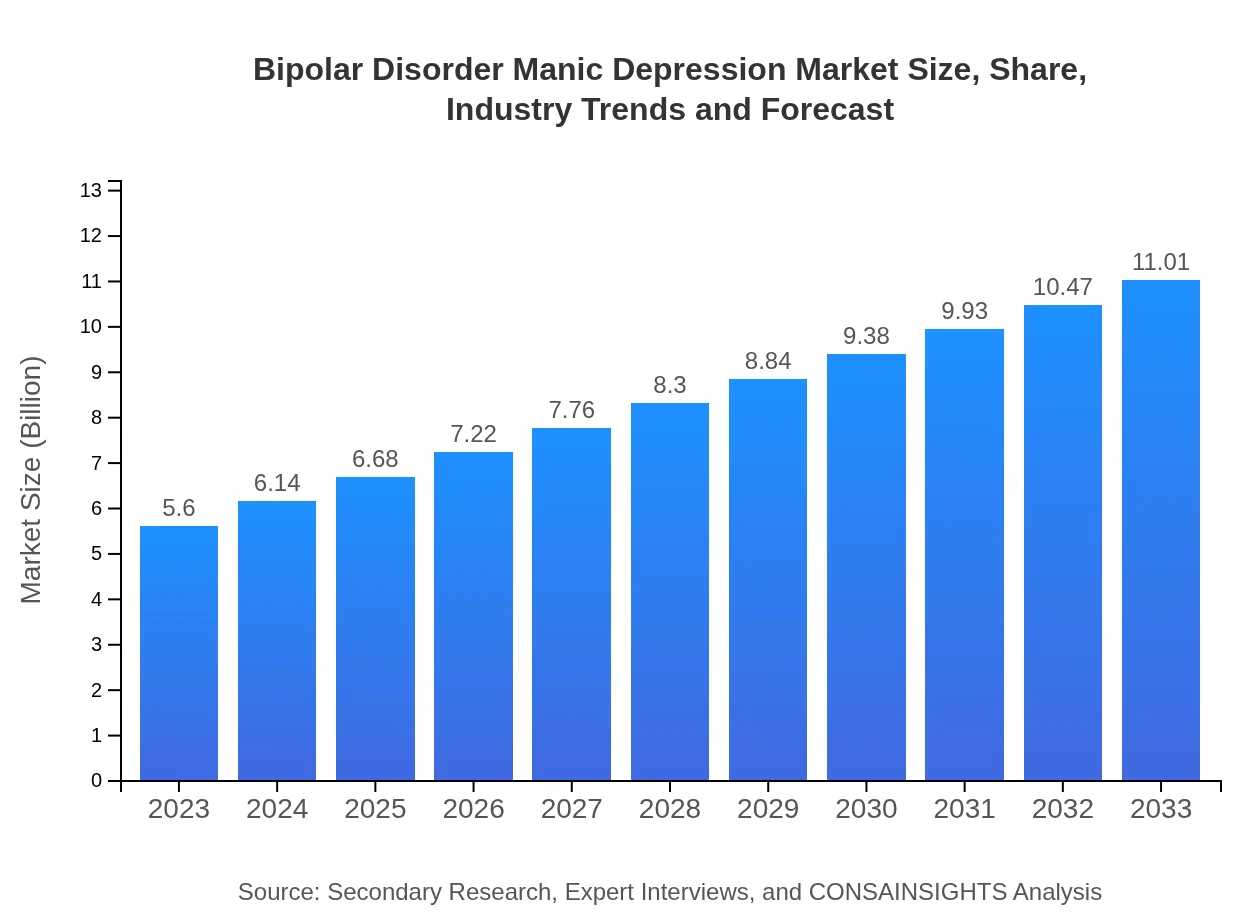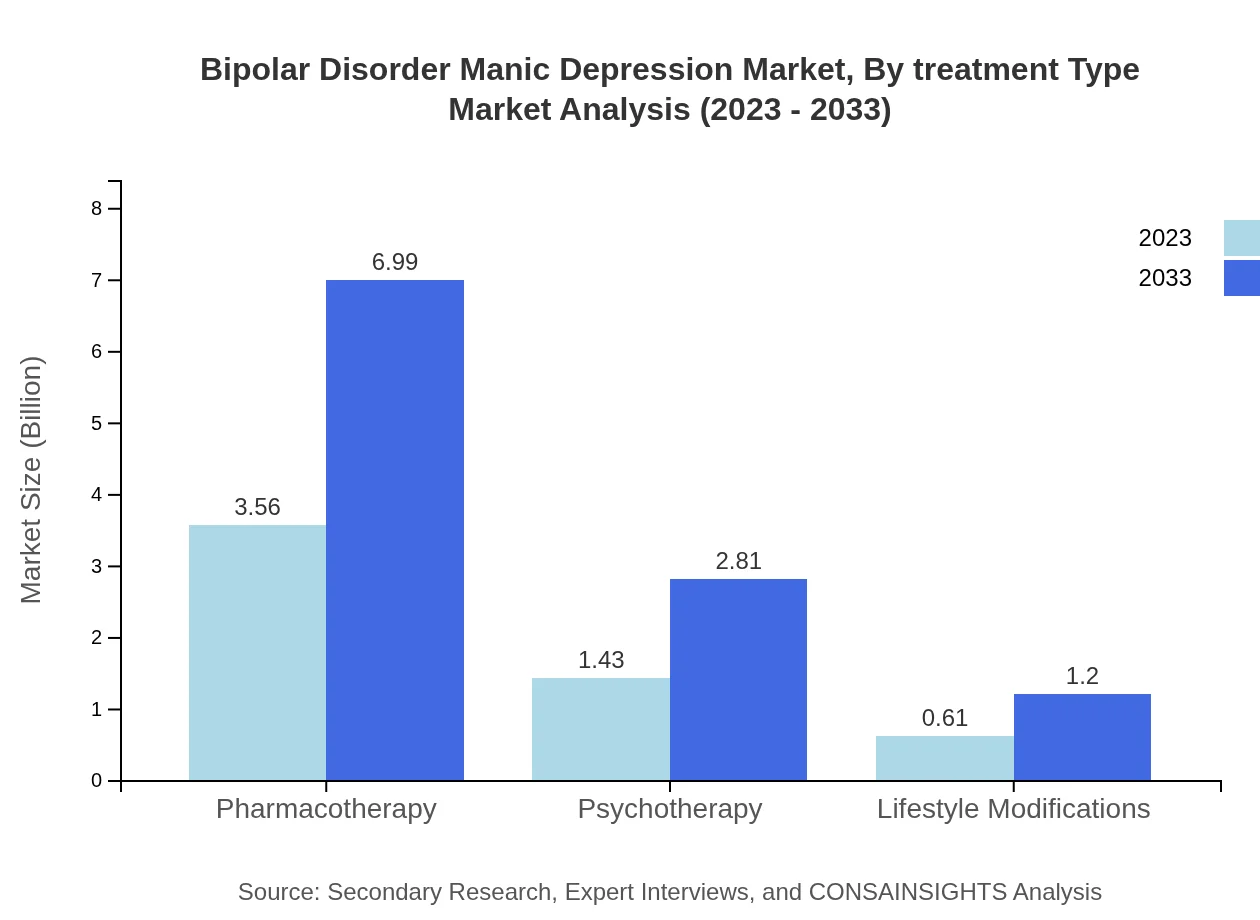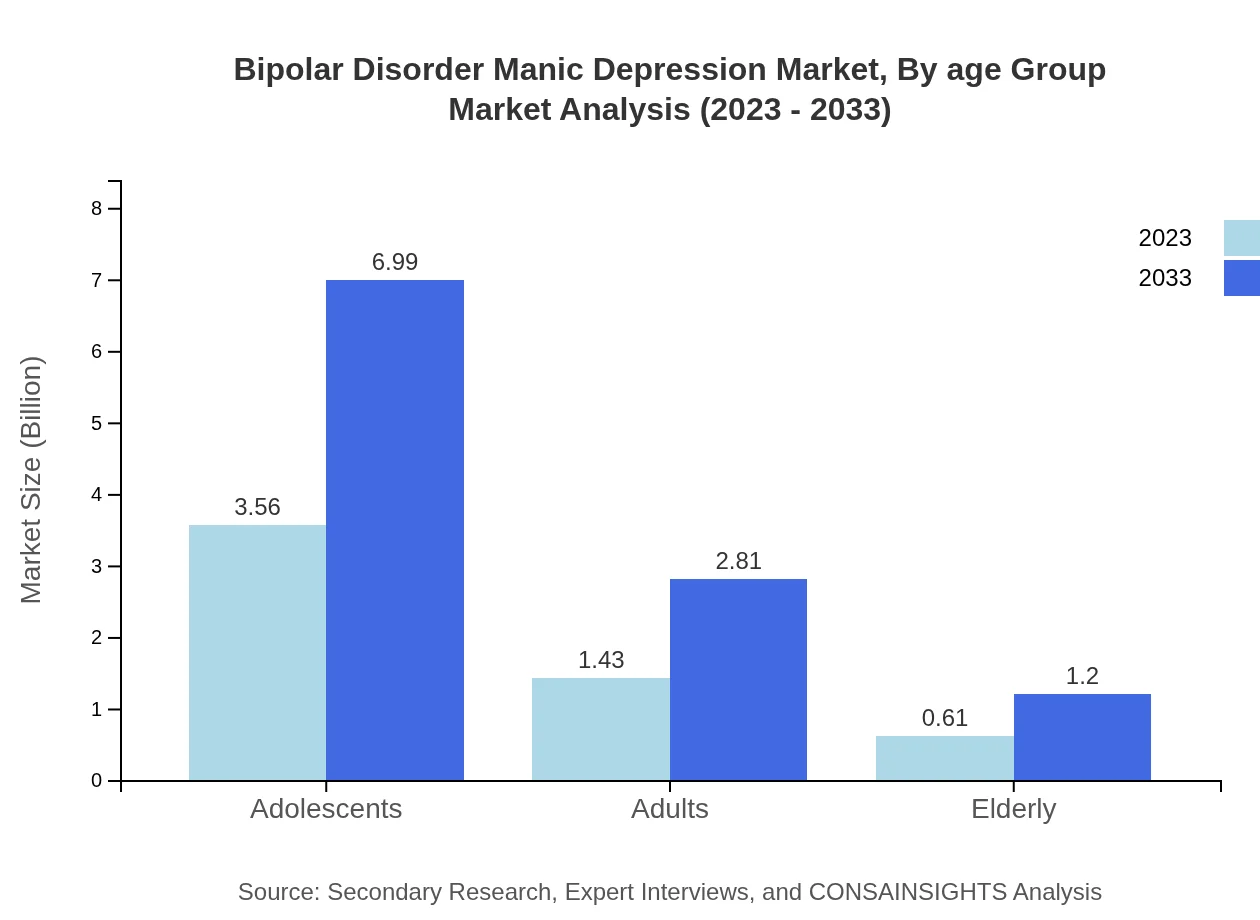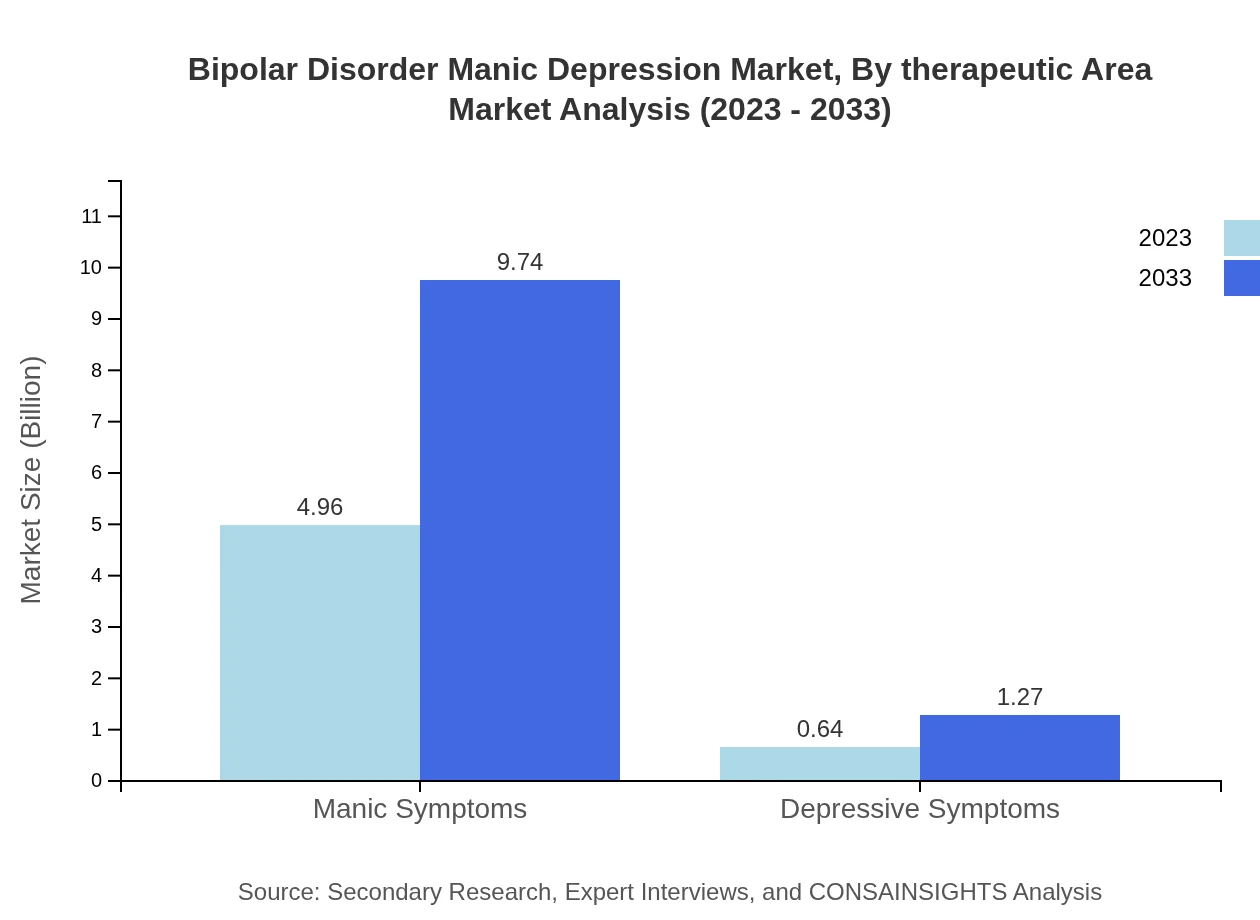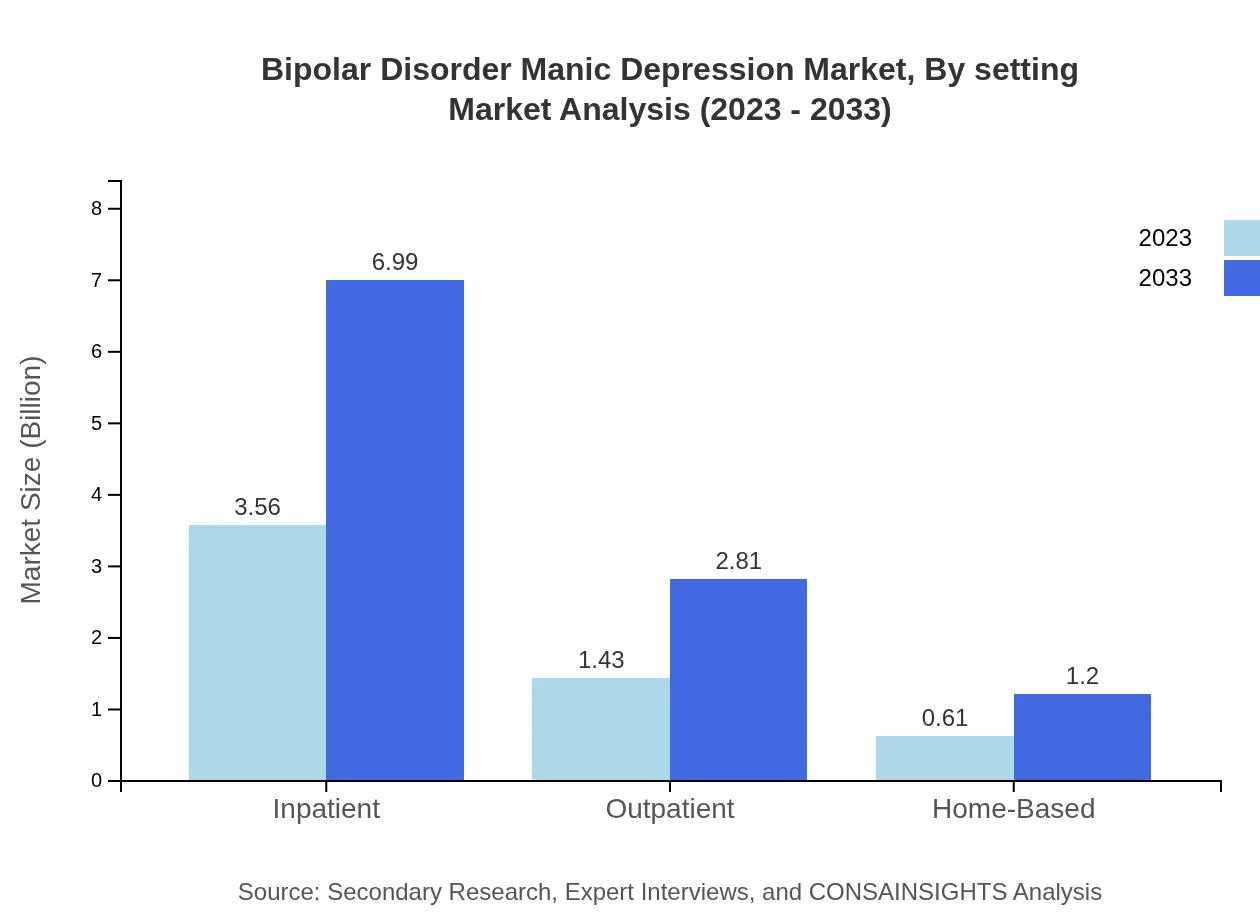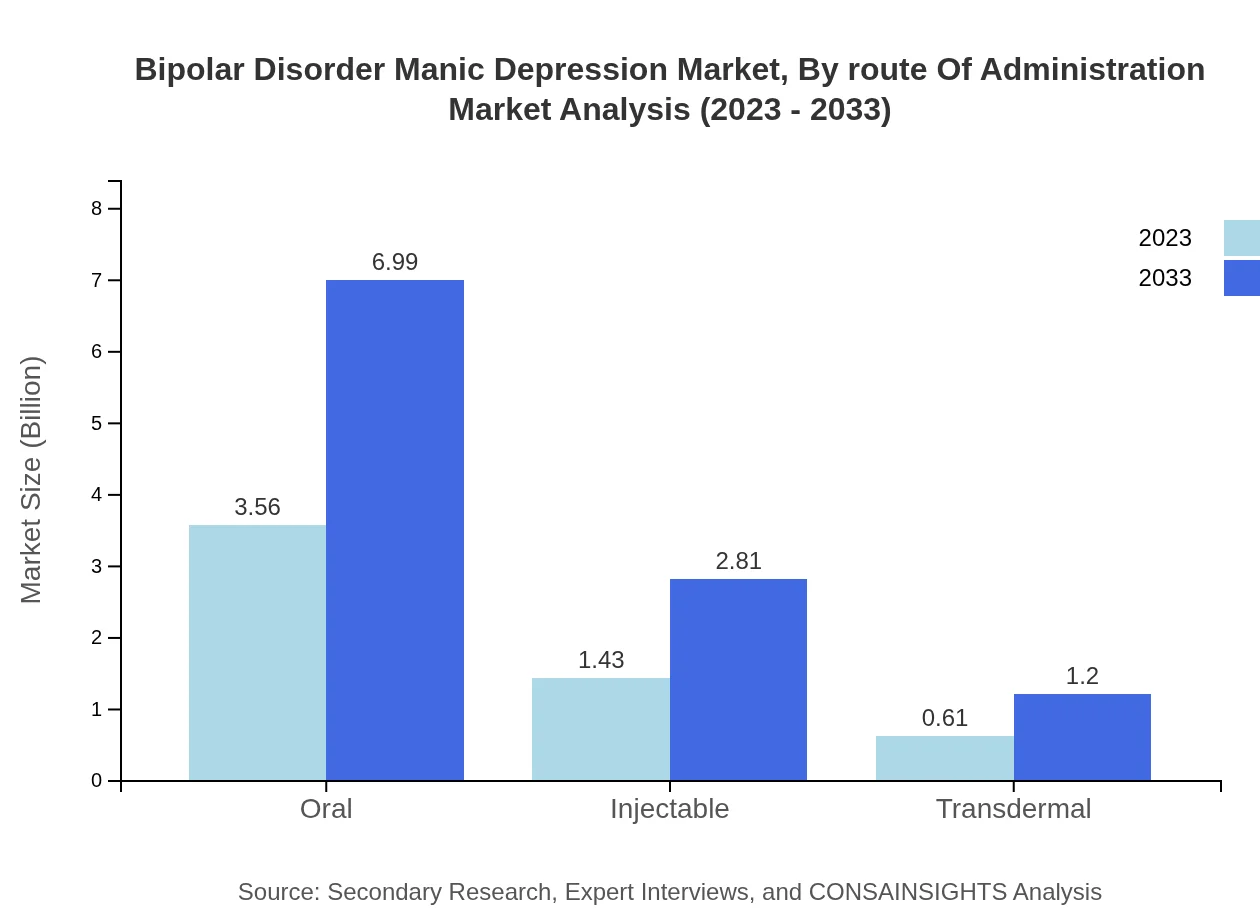Bipolar Disorder Manic Depression Market Report
Published Date: 31 January 2026 | Report Code: bipolar-disorder-manic-depression
Bipolar Disorder Manic Depression Market Size, Share, Industry Trends and Forecast to 2033
This report covers the market insights, trends, and forecasts for Bipolar Disorder and Manic Depression from 2023 to 2033, including industry size, growth rates, regional performance, market segmentation, and analysis of key players.
| Metric | Value |
|---|---|
| Study Period | 2023 - 2033 |
| 2023 Market Size | $5.60 Billion |
| CAGR (2023-2033) | 6.8% |
| 2033 Market Size | $11.01 Billion |
| Top Companies | Johnson & Johnson, Pfizer Inc., Eli Lilly and Company |
| Last Modified Date | 31 January 2026 |
Bipolar Disorder Manic Depression Market Overview
Customize Bipolar Disorder Manic Depression Market Report market research report
- ✔ Get in-depth analysis of Bipolar Disorder Manic Depression market size, growth, and forecasts.
- ✔ Understand Bipolar Disorder Manic Depression's regional dynamics and industry-specific trends.
- ✔ Identify potential applications, end-user demand, and growth segments in Bipolar Disorder Manic Depression
What is the Market Size & CAGR of Bipolar Disorder Manic Depression market in 2023?
Bipolar Disorder Manic Depression Industry Analysis
Bipolar Disorder Manic Depression Market Segmentation and Scope
Tell us your focus area and get a customized research report.
Bipolar Disorder Manic Depression Market Analysis Report by Region
Europe Bipolar Disorder Manic Depression Market Report:
In Europe, the market is projected to rise from 1.82 billion USD in 2023 to 3.57 billion USD by 2033. Factors such as a well-established healthcare system, comprehensive support for mental health illnesses, and high levels of awareness contribute to this growth.Asia Pacific Bipolar Disorder Manic Depression Market Report:
In the Asia Pacific region, the market is expected to expand from 0.93 billion USD in 2023 to 1.83 billion USD by 2033. Factors contributing to this growth include increasing healthcare access, rising awareness about mental health, and governmental initiatives promoting the mental well-being and treatment of bipolar disorder.North America Bipolar Disorder Manic Depression Market Report:
North America is leading the market, with an expected growth from 2.04 billion USD in 2023 to 4.01 billion USD by 2033. This is largely due to advanced healthcare systems, robust pharmaceutical research, and significant investment in mental health initiatives and programs.South America Bipolar Disorder Manic Depression Market Report:
South America presents a market that is anticipated to grow from 0.09 billion USD in 2023 to 0.17 billion USD by 2033. Challenges such as limited healthcare infrastructure and stigma surrounding mental health may impede growth; however, increasing awareness and investment in mental health services is showing promise.Middle East & Africa Bipolar Disorder Manic Depression Market Report:
The Middle East and Africa market is predicted to double from 0.73 billion USD in 2023 to 1.43 billion USD by 2033. Increased recognition of mental health issues, coupled with improved healthcare access, is propelling growth in this region.Tell us your focus area and get a customized research report.
Bipolar Disorder Manic Depression Market Analysis By Treatment Type
The treatment landscape for Bipolar Disorder is broadly categorized into Pharmacotherapy, Psychotherapy, and Lifestyle Modifications. As of 2023, the market size for Pharmacotherapy is valued at 3.56 billion USD, contributing to 63.53% of the overall treatment market. Psychotherapy follows with a market size of 1.43 billion USD (25.55% share) and Lifestyle Modifications accounting for 0.61 billion USD (10.92% share). These percentages are projected to remain consistent with comparable growth rates by 2033.
Bipolar Disorder Manic Depression Market Analysis By Age Group
Market allocation by age groups reveals significant segments. Adolescents hold the largest share of 3.56 billion USD, representing 63.53% of the market in 2023, while adults are valued at 1.43 billion USD (25.55%), and the elderly segment is at 0.61 billion USD (10.92%). Projected expansions will see these figures increase to 6.99 billion USD, 2.81 billion USD, and 1.20 billion USD respectively by 2033.
Bipolar Disorder Manic Depression Market Analysis By Therapeutic Area
The market based on therapeutic areas bifurcates into two main categories: Manic Symptoms and Depressive Symptoms. Manic Symptoms constitute the heavier revenue contributor, with an estimated size of 4.96 billion USD in 2023, projected to reach 9.74 billion USD by 2033. Depressive Symptoms follow, with 0.64 billion USD in 2023 and expected to grow to 1.27 billion USD by 2033.
Bipolar Disorder Manic Depression Market Analysis By Setting
Inpatient settings dominate the Bipolar Disorder market with a valuation of 3.56 billion USD in 2023 and a consistent share of 63.53%. Outpatient settings contribute 1.43 billion USD (25.55% share) and home-based care accounts for 0.61 billion USD (10.92%). These segments are forecasted to experience substantial growth, aligning with overall market trends by 2033.
Bipolar Disorder Manic Depression Market Analysis By Route Of Administration
The route of administration segmentation includes Oral, Injectable, and Transdermal methods. Oral medications lead with 3.56 billion USD and a share of 63.53% in 2023, followed by Injectables at 1.43 billion USD (25.55%), and Transdermal therapies at 0.61 billion USD (10.92%). This structure will likely maintain similar trends through 2033, with gradual enhancements in effectiveness and availability.
Bipolar Disorder Manic Depression Market Trends and Future Forecast
Tell us your focus area and get a customized research report.
Global Market Leaders and Top Companies in Bipolar Disorder Manic Depression Industry
Johnson & Johnson:
A leading pharmaceutical company focusing on mental health innovations, with a strong portfolio of drugs approved for bipolar disorder treatment.Pfizer Inc.:
Known for its wide range of medications, Pfizer is a significant contributor in the bipolar treatment area, emphasizing both pharmacotherapy and mental health awareness.Eli Lilly and Company:
With a dedicated focus on mental health, Lilly's therapies for bipolar disorder, including antipsychotics and mood stabilizers, make it a key player in this market.We're grateful to work with incredible clients.









FAQs
What is the market size of bipolar Disorder Manic Depression?
The global bipolar disorder manic depression market is currently valued at approximately $5.6 billion. It is projected to grow at a CAGR of 6.8%, indicating significant expansion opportunities over the next decade.
What are the key market players or companies in this bipolar Disorder Manic Depression industry?
Key players in the bipolar disorder manic depression market include major pharmaceutical companies that develop treatments, such as Alkermes, Otsuka Pharmaceutical, and Takeda, all contributing to innovative therapies and advancing care.
What are the primary factors driving the growth in the bipolar disorder manic depression industry?
Growth in this market is driven by increasing awareness of bipolar disorder, advancements in treatment options, and rising mental health concerns prompting the need for effective management solutions and therapies.
Which region is the fastest Growing in the bipolar disorder manic depression market?
The fastest-growing region is North America, with a market value projected to rise from $2.04 billion in 2023 to $4.01 billion by 2033, reflecting a robust demand for mental health services and treatments.
Does ConsaInsights provide customized market report data for the bipolar disorder manic depression industry?
Yes, ConsaInsights offers customized market report data tailored to the bipolar disorder manic depression industry, accommodating specific needs for detailed analysis and insights in various market segments.
What deliverables can I expect from this bipolar disorder manic depression market research project?
Deliverables include comprehensive market analysis, segment insights, competitor landscapes, growth forecasts, and recommendations tailored for strategic decision-making in the bipolar disorder manic depression sector.
What are the market trends of bipolar disorder manic depression?
Current trends include a shift towards personalized treatment plans, integration of technology in therapy, increased focus on adolescent mental health, and holistic treatment approaches gaining popularity among practitioners.

